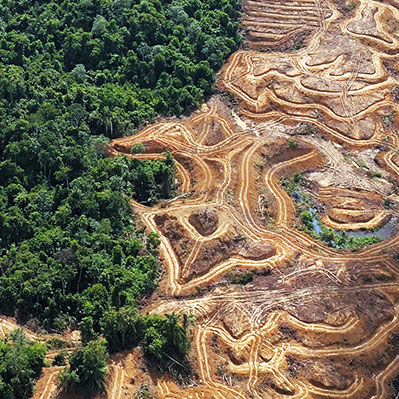Procter & Gamble (P&G) likes to portray itself as a sustainability leader, but when it comes to deforestation, rights abuses, and climate change, it’s actually a classic villain, willing to destroy anything in its path in pursuit of the almighty dollar.
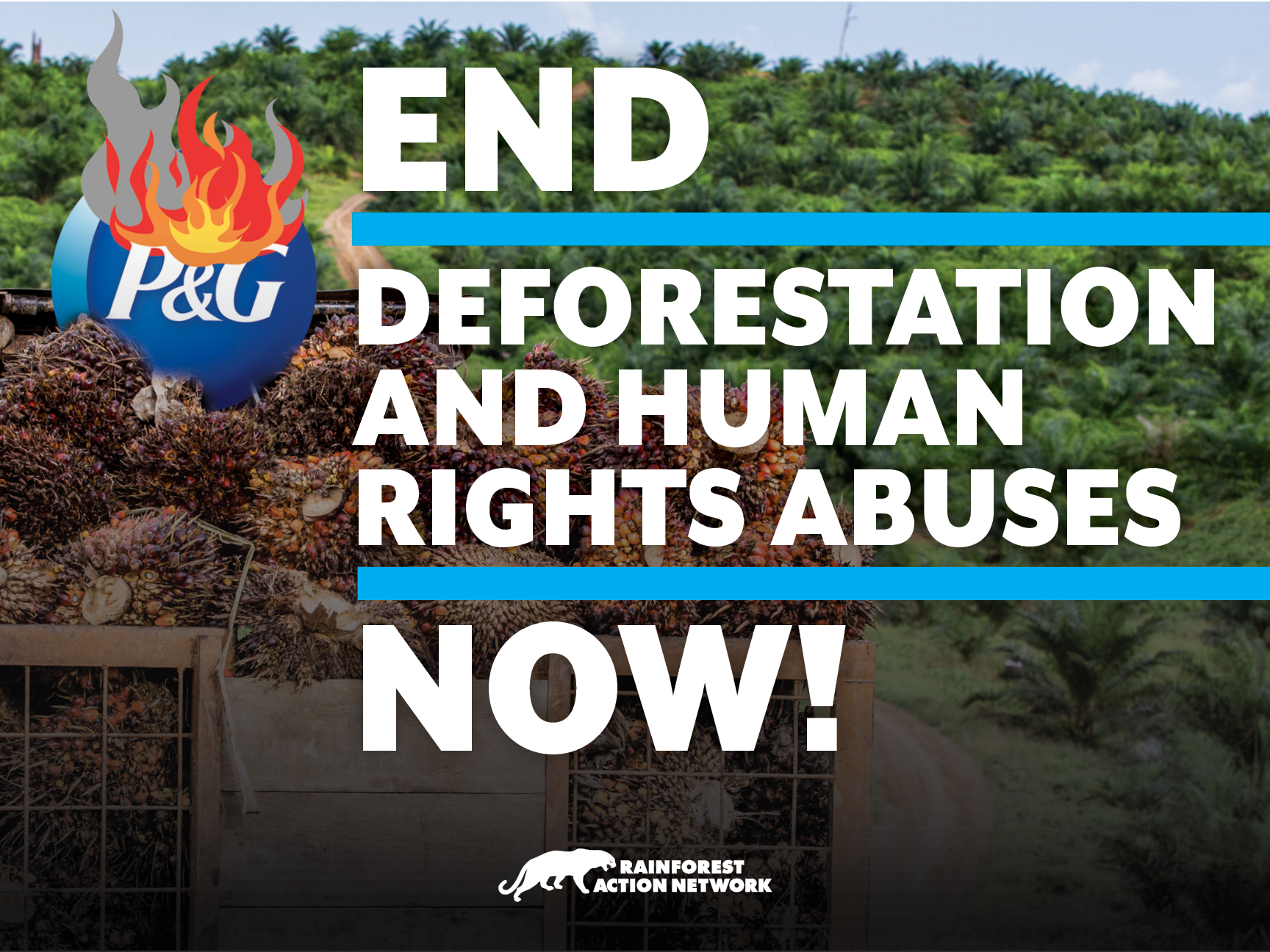
Here are three ways P&G is acting as a climate and rights villain:
- P&G leadership continues to source palm oil through RGE, which is connected to land grabbing in territories belonging to the Pargamanan-Bintang Maria Indigenous community.
- P&G is in the habit of doing business with palm oil companies that, according to US Customs officials, use forced labor.
- Companies in P&G’s supply chain destroy the Leuser Ecosystem and other irreplaceable forests to expand palm oil plantations and keep profit margins high for products like Olay, Head and Shoulders and Tide.
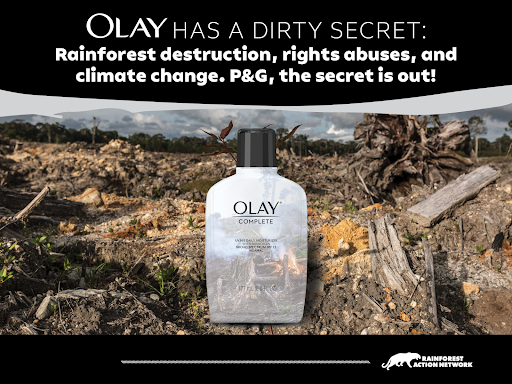
P&G’s biggest commitment is to perpetual growth. For them, $14 billion in annual profits just isn’t enough. In fact, they see their endless growth as a force for good. Here’s what their new CEO Jon Moeller has to say about it:
Over our 184 years, we have shown that our ability to grow is directly connected to our commitment to responsible business and doing good. Our ability to do good is in turn strengthened by our growth. We aim to be a force for growth and a force for good. We see these as inseparable.
But P&G’s growth isn’t a force for good — if it were, companies across their supply chain would adopt protections for workers, the environment and its defenders. They would push for broad adoption of human rights standards like Free, Prior, and Informed Consent (FPIC) for Indigenous peoples, not for longstanding partnerships with serial Indigenous rights violators like RGE.
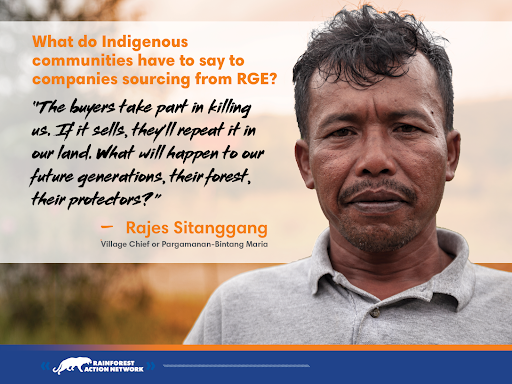
P&G’s growth is destructive to Indigenous peoples, forests, and global climate, and it’s getting worse: As RAN and others have shown, P&G maintains ties with far-flung suppliers who have been destroying tropical and temperate forests at an alarming rate, from Indonesia all the way to Canada.
There is a mountain of evidence piling up against P&G
- An undercover investigation from last June caught P&G’s supplier sourcing palm oil from cleared lowland rainforests in Indonesia’s Leuser Ecosystem. These forests are some of the last remaining habitats for endangered Sumatran orangutans, elephants, tigers and rhinos. The supplier caught with this dirty palm oil, a member of RGE group known as APICAL, is one of P&G’s primary palm-oil middlemen.
- An earlier investigation caught the same supplier to the RGE group sourcing palm oil from a protected peat forest that is known as the “orangutan capital of the world.”
- This was the second time we exposed RGE for its role in destruction of the Leuser Ecosystem. In late 2020, we uncovered that RGE was sourcing palm oil from a mill used by the notorious palm oil producer PT Tualang Raya, which defied a nationwide palm oil moratorium in 2018 when it tore down 664 acres of the Leuser Ecosystem.
- In Kalimantan, on the island of Borneo, our forest footprint report found that P&G contributed to the conversion of 552,000 acres of rainforests to palm oil plantations via its suppliers.
- US Customs and Immigration blocked palm oil and associated products from P&G palm oil suppliers FGV and Sime Darby for their use of forced labor.
- A report published by Friends of the Earth exposed P&G for its connection to other problematic palm oil suppliers in Indonesia.
- Recent reports by NRDC and STAND.earth also paint a clear picture of P&G’s role in the destructive logging of temperate forests in Canada.
Instead of taking decisive action to address these scandals and repair shaken investor confidence, P&G issued a shocking report stating that it would not make wholesale commitments to eliminating palm oil sourced from intact forests — this despite a scientific consensus on the urgency to do so.
P&G continues to make misleading claims to investors and consumers about its small forest footprint, yet refuses to publish any formal accounting of its forest impacts. Its outright refusal to protect forests is our best indication of what is to come — more destruction, and more enabling of suppliers within its vast supply chain who continue to threaten forests and vulnerable communities.
Help us tell P&G to clean up its act by suspending all sourcing from RGE Group.
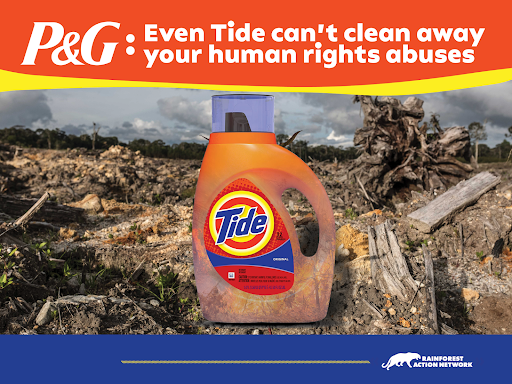
It’s critical that both consumers and investors alike call on P&G to stop sourcing commodities from suppliers who destroy primary forests, including intact forest landscapes and critical wildlife habitat. If P&G fails to do so, we must be willing to take our business elsewhere.
If P&G really see itself as the hero in a fantasy novel about it’s own goodness and perpetual growth — and not as one of the world’s biggest climate and rights villains — then it must stop with its half measures and fully embrace the frontline communities, endangered species, and threatened forests caught up in its vicious cycle of destruction.
Wouldn’t it just be better to be a climate and rights hero, anyway?
